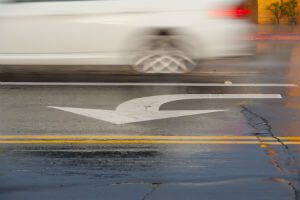Fault in a Left-Turn Car Crash
 Left turns are one of the most dangerous traffic maneuvers because you are cutting across one or more lanes of traffic that are going in the opposite direction. If you pull out too soon, you risk getting into a dangerous crash with another driver who may have the right of way. You may be at fault for this type of collision.
Left turns are one of the most dangerous traffic maneuvers because you are cutting across one or more lanes of traffic that are going in the opposite direction. If you pull out too soon, you risk getting into a dangerous crash with another driver who may have the right of way. You may be at fault for this type of collision.
However, proving fault for these crashes may not be so simple. The driver making the turn is often at fault, but drivers going the opposite direction could also be held liable. This is especially true if you are a passenger as both cars involved could be at fault.
Reasons for These Crashes
According to research from the National Highway Traffic Safety Administration, 36 percent of automobile crashes happen at intersections, and many of those crashes involve left turns.
These crashes are often the result of the turning driver’s negligent behavior. Common examples of this include:
- Turning when the view of oncoming traffic is obstructed
- Misjudging how fast an oncoming vehicle is approaching
- Distracted driving, such as texting and driving or pressing buttons on the radio or dashboard
- Failing to use the left-turn signal
- Not yielding the right of way when the light is green and not a green arrow
- Running a red light
- Following the car in front of you making a left without making sure the path is clear
Drivers who are turning must yield to oncoming traffic, including pedestrians, bicyclists and motorcyclists. They must make sure it is safe for them to move across the intersection without hitting oncoming traffic.
Exceptions When Oncoming Drivers May be at Fault
A driver making a left-hand turn might not be at fault if the other driver involved in the crash (who is traveling straight) was driving way beyond the speed limit, particularly if the other driver sped up when the light turned yellow. Aside from driving too fast, the other driver may be at fault if he or she was under the influence of drugs and alcohol that would have prevented them from driving in a safe manner.
An unforeseen circumstance could also lead to a crash for which the turning driver is not liable. For example, if an animal darts out into the road and delays your turn, the driver of the oncoming car may be liable for the crash.
Evidence That May be Used to Prove Fault
Different types of evidence may be used to prove fault in these left-turn car crashes, including:
- Testimony from witnesses
- Police reports
- Surveillance recordings
- Dash cam footage
- Reports from collision reconstruction specialists
- Pictures
- Black box data from the vehicles
Safety When Making Left Turns
There are several things you can do to help lower your risk of a crash when making a left turn, or if you are traveling through an intersection where another driver may make a left turn in front of your path.
First, if you can avoid making a left turn, you should consider doing so because these are much more dangerous than right-hand turns.
Always use your turn signal to alert other drivers of your intention to turn. Drivers traveling the opposite way cannot see the traffic light you see, so they may not know vehicles may be turning left. If drivers are speeding, they may see your turn signal and slow down, which gives them more time to react to trouble.
Be patient waiting for the correct time to turn. It is important not to take an unnecessary risk. You can always wait a little bit longer. If you are unsure if you can make it across the intersection, trust your instinct and wait for more traffic to pass by.
Even if you have a green arrow, which gives you the right of way, look across the intersection for vehicles that may be running a red light.
Injured in a Left-Turn Car Crash? Seek Legal Help Today
We understand what victims experience after a car crash and are prepared to pursue compensation to help you through your recovery.
Our Minneapolis auto accident lawyers have helped many car crash victims recover compensation for their injuries and there are no upfront fees for our services.
Set up your free consultation by calling (612) TSR-TIME. No fees and no risk.



